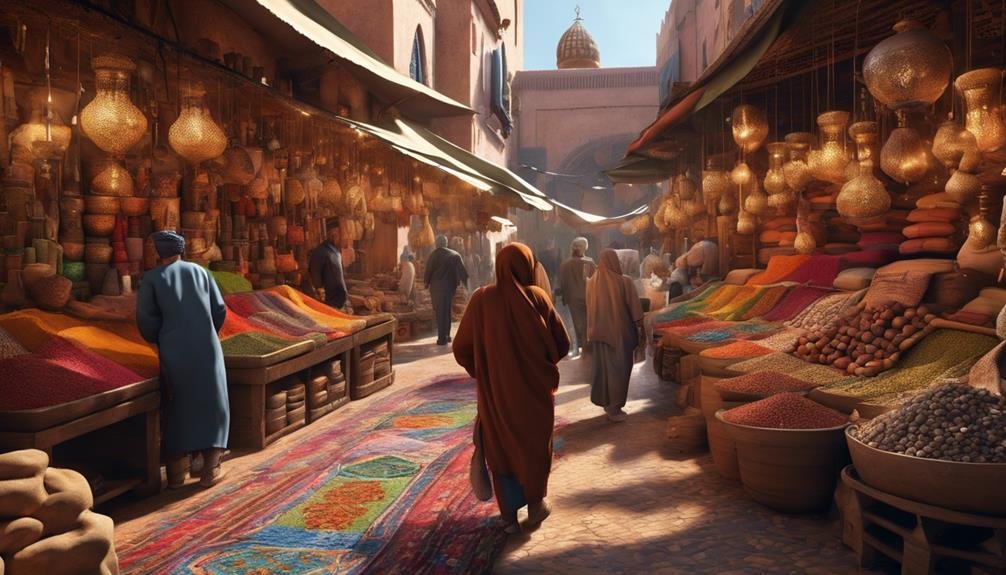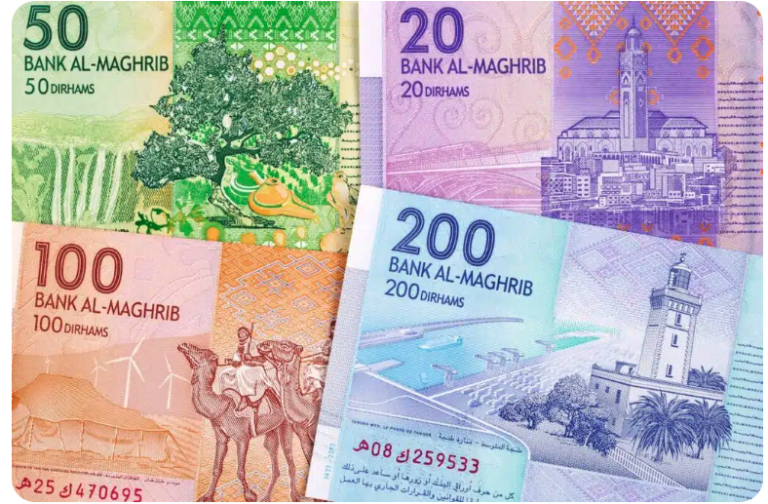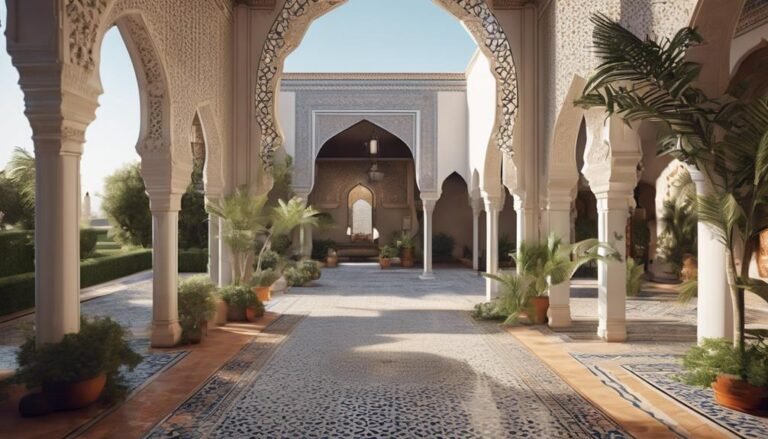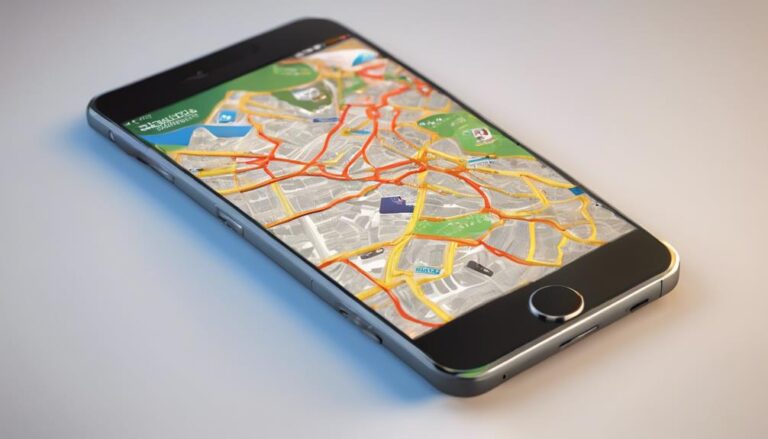When bargaining in Moroccan markets, immerse yourself in the lively dance of negotiation. Understand that prices are flexible and shaped by cultural norms. Build trust with vendors through friendly conversations and respect for etiquette. Research market prices to gauge the value of items. Use body language cues to set clear price boundaries. Engage with vendors by showing interest in their products and techniques. Know when to walk away to maintain control. Remember, greeting vendors warmly and being patient can lead to successful deals. Mastering negotiation enriches your market experience and guarantees you get the best deals.
Key Takeaways
- Understand cultural norms in bargaining.
- Build trust and engage in polite conversation.
- Research market prices and compare.
- Master body language cues and set clear boundaries.
- Know when to walk away to maintain control.
Understanding the Market Dynamics
To comprehend the intricacies of negotiating prices in Moroccan markets, you must first explore the underlying dynamics that govern these vibrant trading spaces. Market dynamics in Morocco are deeply intertwined with cultural norms, shaping the way negotiations unfold. When delving into negotiation strategies in these markets, it's essential to grasp the significance of social cues.
Moroccan markets, known as souks, are a hub of activity where locals and tourists haggle over a myriad of goods. The bargaining process isn't merely about reaching a transaction; it's a dance of wits influenced by cultural nuances. Understanding the market dynamics involves recognizing that prices aren't fixed but rather fluid, open to adjustment based on the interaction between buyer and seller.
In this bustling environment, negotiation strategies often rely on establishing a rapport with the seller. Building a connection through polite greetings and inquiries about goods can set a positive tone for the bargaining ahead. Observing social cues such as body language and tone of voice can provide valuable insights into the seller's willingness to negotiate. Mastering these elements is key to maneuvering the labyrinth of Moroccan markets successfully.
Cultivating a Friendly Relationship
When navigating the bustling Moroccan markets, establishing trust with vendors by showing genuine interest in their products is crucial.
Engaging in polite conversation can go a long way in fostering a friendly relationship and creating a more positive atmosphere for negotiations.
Establish Trust With Vendors
Building a friendly rapport with Moroccan market vendors is key to establishing trust and potentially negotiating better prices. When engaging in the vibrant marketplace, remember that cultural etiquette plays a significant role.
Greet vendors warmly, inquire about their day, and show genuine interest in their products. This sets a positive tone for negotiations. Utilize bargaining strategies such as starting with a friendly conversation before discussing prices.
Show Interest in Products
Engage with the vendors by expressing genuine curiosity and interest in their products, laying the foundation for a friendly relationship that can enhance your negotiating experience in Moroccan markets.
When showing interest in products, take the time to evaluate the quality and uniqueness of what's being offered. This not only helps you gauge the item's worth but also shows the vendor that you value their goods.
Remember to respect local customs and cultural etiquette during this process. Additionally, by demonstrating a sincere appreciation for their merchandise, you can open the door to effective bargaining strategies.
Establishing a connection through shared admiration for the products can create a positive atmosphere for negotiations and potentially lead to more favorable prices.
Engage in Polite Conversation
To foster a warm and inviting atmosphere during your interactions with Moroccan market vendors, initiating friendly conversations can play a key role in building rapport and paving the way for successful negotiations. Engaging in polite conversation not only showcases your interest in the culture but also aligns with cultural etiquette, making the experience more enjoyable for both parties.
Here are some tips to help you navigate these conversations effectively:
- Ask about the vendor's day or well-being.
- Compliment the craftsmanship or selection of goods.
- Share a bit about your own background or travels.
- Express genuine curiosity about the products or local customs.
- Remember to use respectful language and maintain a friendly tone throughout the interaction.
Researching Market Prices
When exploring Moroccan markets, regularly comparing prices across different vendors can provide valuable insights into the current market rates. Price comparison is essential in understanding the range of prices for a particular item, empowering you with knowledge to negotiate effectively. Observing local customs and haggling skills can also play a significant role in your ability to secure a good deal.
To conduct effective price comparison, take note of the initial prices quoted by various sellers for the items you're interested in. By doing so, you can start to gauge the average price range and identify outliers. This information arms you with bargaining tactics, allowing you to confidently negotiate for a fair price based on your research.
As you move through the bustling markets of Morocco, be attentive to the dynamic pricing strategies employed by vendors. Engaging in this practice not only helps you make informed purchasing decisions but also enhances your overall haggling skills, setting the stage for successful negotiations ahead.
Mastering the Art of Negotiation
To master the art of negotiation in Moroccan markets, pay close attention to body language cues to gauge the seller's willingness to bargain.
Establish your price boundaries beforehand and stick to them firmly during the negotiation process.
Body Language Cues
Effective negotiation in Moroccan markets hinges greatly on your ability to interpret and respond to subtle body language cues from the sellers. Nonverbal cues and cultural differences play a significant role in understanding the seller's stance. Power dynamics and assertiveness techniques are vital when engaging in negotiations.
Here are some key body language cues to look out for:
- Eye Contact: Indicates sincerity or intimidation.
- Hand Gestures: Reflect emotions and emphasis.
- Posture: Shows confidence or submission.
- Facial Expressions: Reveals feelings and reactions.
- Personal Space: Reflects comfort level and boundaries.
Setting Price Boundaries
Mastering the art of negotiation in Moroccan markets involves skillfully establishing clear price boundaries to guide the interaction. When setting boundaries, it's important to have a clear understanding of the product's value and a maximum price you're willing to pay.
Begin by politely suggesting a starting price lower than your actual limit, allowing room for negotiation. Remember, it's common for sellers to initially set high prices, so be prepared to haggle.
Politely express your price range and stick to it firmly to avoid overpaying. Setting boundaries not only helps you stay within your budget but also signals to the seller that you're a knowledgeable and serious buyer, setting the tone for a successful negotiation process.
Building Rapport First
Start by establishing a genuine connection with the seller to lay the foundation for successful negotiations in Moroccan markets. Building trust and fostering effective communication are essential components of creating a positive atmosphere for haggling. Here are some key strategies to help you build rapport before diving into price discussions:
- Smile and make eye contact: Show warmth and friendliness to create a welcoming environment.
- Ask about their day: Showing interest in the seller as a person can help establish a personal connection.
- Compliment their merchandise: Demonstrating appreciation for their goods can be a great conversation starter.
- Use polite greetings: Simple gestures like saying 'hello' or 'good morning' can go a long way in setting a friendly tone.
- Engage in small talk: Casual conversation can help break the ice and build a more relaxed atmosphere for negotiations.
Setting a Realistic Budget
To make the most of your shopping experience in Moroccan markets, it's important to establish a realistic budget that aligns with your preferences and financial capabilities. Budget planning is essential as it sets the foundation for successful bargaining and helps you stay within your means. Keep in mind the cultural differences when setting your budget, as prices and bargaining customs may vary from what you are accustomed to.
Here is a simple budget planning table to guide you:
| Item | Estimated Price Range |
|---|---|
| Moroccan Rug | $100 – $300 |
| Leather Bag | $30 – $70 |
| Spices | $5 – $15 |
| Ceramic Plate | $10 – $20 |
| Lantern | $15 – $40 |
Demonstrating Interest in the Product
Show genuine interest in the product by asking questions about its craftsmanship and history, which can build rapport with the seller and potentially lead to better deals. When negotiating prices in Moroccan markets, demonstrating interest in the product is an important step in the bargaining process. Here's how you can effectively show your interest:
- Ask about the materials used: Inquire about the quality of the materials and how they were sourced.
- Question the artisan techniques: Learn about the traditional methods or unique skills involved in creating the product.
- Inquire about the product's significance: Understand the cultural or historical importance of the item you're interested in.
- Express admiration for the details: Point out specific features that catch your eye and discuss why you find them appealing.
- Listen actively: Show that you're engaged in the conversation by actively listening to the seller's responses and asking follow-up questions to deepen your understanding.
Knowing When to Walk Away
Knowing when it's time to walk away during a negotiation is essential for maintaining control and ensuring you don't overpay. Walking away can be a powerful strategy in Moroccan markets. It shows that you're serious about getting a fair price and can help reset the dynamics of the negotiation in your favor. This tactic isn't about giving up but rather about using it as a negotiation tool.
Incorporating walking away into your negotiation tactics requires perseverance. It's important to stay firm and composed even if the vendor tries to pressure you into making a purchase. Remember, walking away doesn't mean the end of the deal; it's often a way to signal to the seller that you're willing to go elsewhere if a reasonable price can't be agreed upon. By being prepared to walk away when necessary, you demonstrate your willingness to find a mutually beneficial agreement, which can ultimately lead to a successful purchase at a fair price.
Showing Respect and Patience
During negotiations in Moroccan markets, demonstrating respect and patience can greatly influence the outcome of your interactions with vendors. When engaging in bargaining, keep in mind the cultural etiquette of Morocco and the importance of showing courtesy throughout the process. Here are some key points to keep in mind:
- Greet vendors politely: Initiating the conversation with a warm greeting sets a positive tone for the negotiation.
- Use proper language: Respect the local culture by using basic Arabic phrases or at least attempting to communicate in the local dialect.
- Remain calm and composed: Patience is key; avoid becoming agitated or showing frustration, as this can hinder the negotiation process.
- Listen actively: Pay attention to the vendor's responses and show genuine interest in what they've to say.
- Show appreciation: Express gratitude, even if you don't reach an agreement, as this reflects positively on you and may lead to better deals in the future.
Conclusion
As you navigate through the bustling Moroccan markets, remember to blend assertiveness with charm. Picture yourself gracefully haggling over vibrant rugs or fragrant spices, all while respecting the seller's craft.
By mastering the art of negotiation and showcasing genuine interest, you'll find yourself in a dance of bargaining and camaraderie.
So, go forth with confidence, armed with knowledge and patience, ready to strike a deal that satisfies both parties. The market awaits your skilled hand and friendly smile.

The Editorial Team is a passionate group of Morocco enthusiasts dedicated to sharing the beauty, culture, and wonders of this captivating country. With diverse backgrounds and a deep love for travel, we strive to bring you engaging and informative content that inspires your Moroccan adventures. From uncovering hidden gems and sharing local insights to exploring mouthwatering cuisine and showcasing the vibrant lifestyle, our team is committed to providing you with valuable resources and exciting stories that enhance your exploration of Morocco. Join us on this journey as we celebrate the rich heritage and unforgettable experiences that make Morocco truly special.







